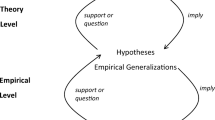Abstract
How useful are methods aiming to make research findings more replicable—particularly preregistration—for developing good psychological theories? We distinguish between two kinds of flexibility—the flexibility of a theory and the flexibility of a model—and argue that even when attempts are made to reduce model flexibility, the lack of attention to theoretical flexibility renders the utility of such methods questionable. We speculate that psychology’s current issues with replicability and model flexibility would grow increasingly irrelevant as the underlying theories become less flexible. The path towards better theory development requires us to place more attention on the assessment and evaluation of theoretical flexibility.
Similar content being viewed by others
Notes
Here we focus on methods that solely aim to increase replicability. Although registered reports have features similar to that of preregistration, our understanding is that the main aim of that publication format is to protect against potentially adversarial ad hoc reasoning of reviewers with conflicting professional interests once data is collected.
Preregistration also does not require the modeler to specify the relationship between the theory and other good theories (the second criterion for a good theory; Deutsch 2016). However, the discussion of this issue is outside the scope of the current paper.
References
Deutsch, D. (2011). The beginning of infinity. London: The Penguin Press.
Deutsch, D. (2016). The logic of experimental tests, particularly of Everettian quantum theory. Studies in History and Philosophy of Science Part B: Studies in History and Philosophy of Modern Physics, 55, 24–33. https://doi.org/10.1016/j.shpsb.2016.06.001.
Fiedler, K. (2017). What constitutes strong psychological science? The (neglected) role of diagnosticity and a priori theorizing. Perspectives on Psychological Science, 12(1), 46–61. https://doi.org/10.1177/1745691616654458.
Gigerenzer, G., & Selten, R. (2001). Bounded rationality: the adaptive toolbox. Cambridge: MIT Press.
Krefeld-Schwalb, A., Donkin, C., Newell, B. R., & Scheibehenne, B. (2018). Empirical comparison of the adjustable spanner and the adaptive toolbox models of choice. Journal of Experimental Psychology: Learning, Memory, and Cognition, 45(7), 1151–1165. https://doi.org/10.1037/xlm0000641.
Lee, M. D., Criss, A. H., Devezer, B., Donkin, C., Etz, A., Leite, F. P., Matzke, D., Rouder, J. N., Trueblood, J. S., White, C. N., & Vandekerckhove, J. (2019). Robust modeling in cognitive science. Computational Brain & Behavior. https://doi.org/10.1007/s42113-019-00029-y.
Newell, B. R. (2005). Re-visions of rationality? Trends in Cognitive Sciences, 9(1), 11–15. https://doi.org/10.1016/j.tics.2004.11.005.
Nosek, B. A., Ebersole, C. R., DeHaven, A. C., & Mellor, D. T. (2018). The preregistration revolution. Proceedings of the National Academy of Sciences, 115(11), 2600–2606. https://doi.org/10.1073/pnas.1708274114.
Pitt, M. A., & Myung, I. J. (2002). When a good fit can be bad. Trends in Cognitive Sciences, 6(10), 421–425. https://doi.org/10.1016/S1364-6613(02)01964-2.
Popper, K. (1959). The Logic of Scientific Discovery. London: Routledge.
Roberts, S., & Pashler, H. (2000). How persuasive is a good fit? A comment on theory testing. Psychological Review, 107(2), 358–367. https://doi.org/10.1037/0033-295X.107.2.358 .
Acknowledgments
This paper benefitted from discussions with Balazs Aczel and Arthur Kary. The authors were supported by the Australian Research Council (DP160101186; DP170101684).
Author information
Authors and Affiliations
Corresponding author
Additional information
Publisher’s Note
Springer Nature remains neutral with regard to jurisdictional claims in published maps and institutional affiliations.
Rights and permissions
About this article
Cite this article
Szollosi, A., Donkin, C. Neglected Sources of Flexibility in Psychological Theories: from Replicability to Good Explanations. Comput Brain Behav 2, 190–192 (2019). https://doi.org/10.1007/s42113-019-00045-y
Published:
Issue Date:
DOI: https://doi.org/10.1007/s42113-019-00045-y




